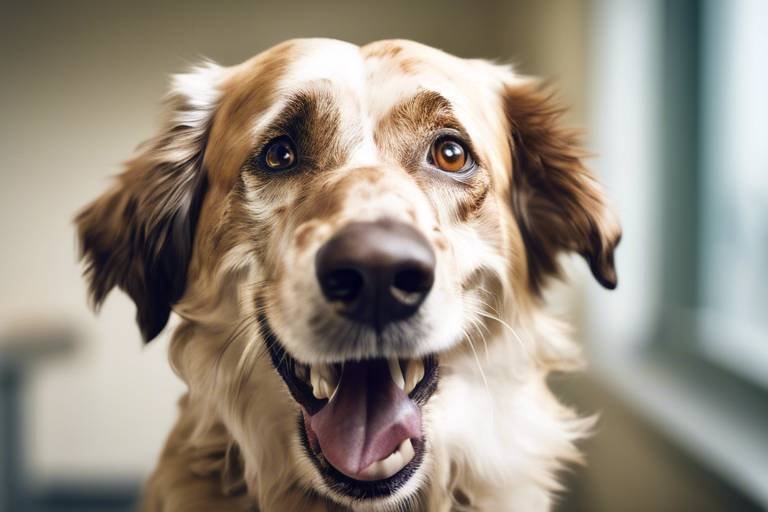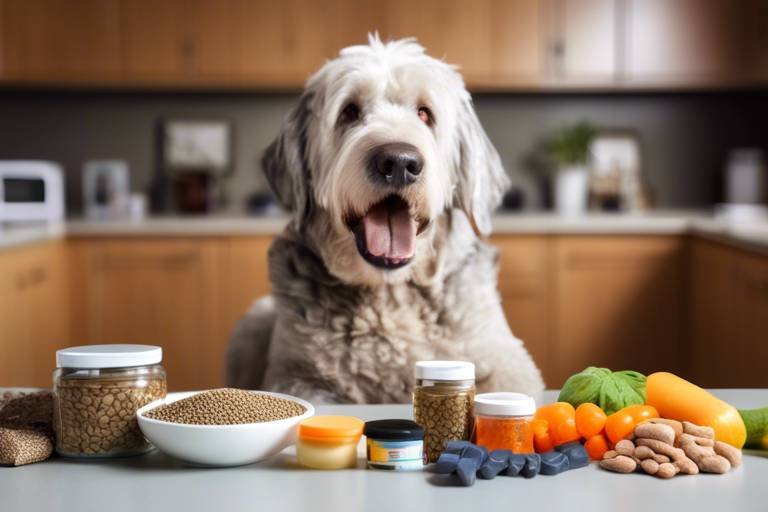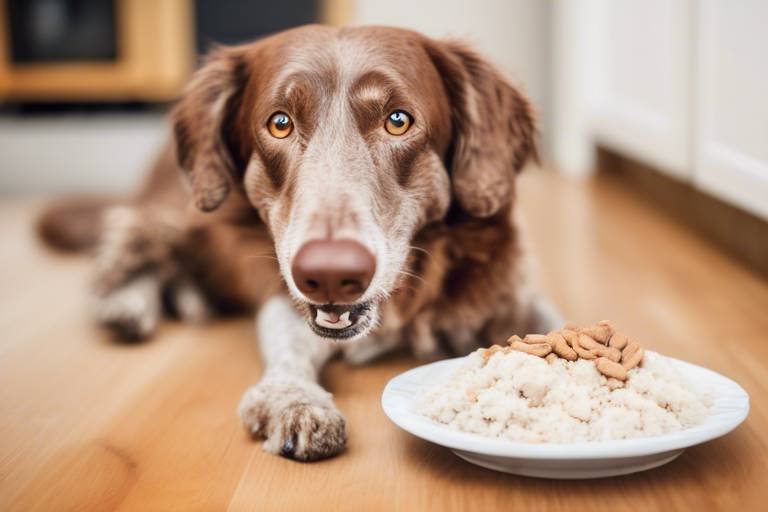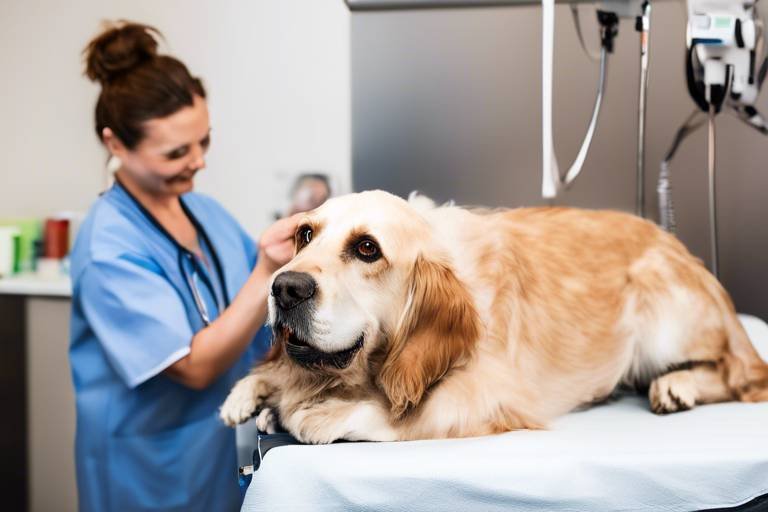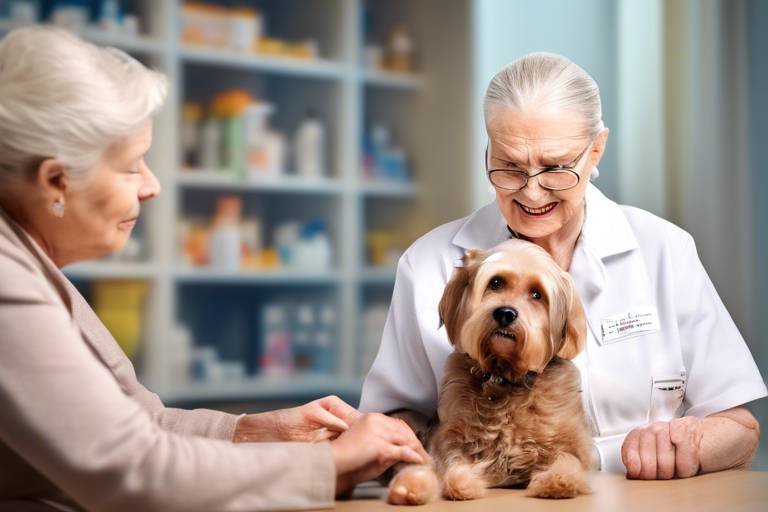The Importance of Regular Vet Visits for Senior Animals
As our beloved pets age, their health needs evolve, making it crucial for pet owners to prioritize regular veterinary visits. Just like humans, senior animals experience a myriad of changes in their bodies that can significantly affect their quality of life. These changes can be subtle at first, but without proper monitoring and intervention, they can lead to serious health issues. By ensuring that your senior pet receives consistent veterinary care, you not only enhance their chances of living a longer, healthier life but also strengthen the bond you share with them.
Imagine your furry friend as a wise old sage, full of stories and experiences, but also facing the challenges that come with age. It’s our responsibility to ensure they have the best possible care during their golden years. Regular check-ups can help detect potential problems early, allowing for timely treatment that can make all the difference. This proactive approach is akin to catching a small leak in your roof before it turns into a full-blown waterfall in your living room!
During these veterinary visits, veterinarians can perform comprehensive examinations that include:
- Physical assessments to check for any signs of discomfort or illness.
- Blood tests to monitor organ function and detect underlying issues.
- Vaccination updates to keep your pet protected against diseases.
Moreover, these appointments are an excellent opportunity for pet owners to discuss any behavioral changes or concerns they may have noticed at home. Whether it’s a change in appetite, energy levels, or even bathroom habits, sharing these observations with your vet can provide valuable insights into your pet’s health. Remember, your veterinarian is not just a doctor; they are a partner in your pet’s well-being.
In conclusion, regular vet visits for senior animals are not merely a routine task; they are a vital part of ensuring your pet lives a happy, healthy life as they age. By staying vigilant and proactive, you can help your furry companion navigate their senior years with grace and comfort.
Here are some common questions pet owners have regarding the importance of regular vet visits for senior animals:
- How often should I take my senior pet to the vet? It's generally recommended to schedule vet visits every 6 months for senior pets, as they can experience health changes more rapidly than younger animals.
- What signs should I look for that indicate my pet needs to see the vet? Look for signs such as decreased energy, changes in appetite, difficulty moving, or any unusual behavior. If you notice anything concerning, it’s best to consult your veterinarian.
- Are there specific tests my senior pet should undergo during vet visits? Yes, senior pets may benefit from blood tests, urinalysis, and dental check-ups to monitor their overall health and catch any potential issues early.

Understanding Senior Pet Health
This article explores the critical reasons for scheduling regular veterinary appointments for senior pets, emphasizing their unique health needs and the benefits of preventive care in enhancing their quality of life.
As our beloved companions age, they undergo a myriad of health changes that can significantly impact their quality of life. Understanding these changes is not just beneficial; it's essential for every pet owner who wants to ensure their furry friends remain happy and healthy in their golden years. Senior pets, typically defined as those aged seven years and older, can experience a range of physical and emotional changes that require special attention. For instance, their metabolism may slow down, leading to weight gain if their diet isn't adjusted accordingly. Additionally, they may develop conditions such as arthritis, dental diseases, or even cognitive dysfunction, similar to dementia in humans.
Recognizing these changes early can empower pet owners to provide better care. It's like being a detective; you need to observe your pet closely to catch the subtle signs that indicate something might be amiss. Regular vet visits become a crucial part of this process, as they allow for early detection of potential health issues. But it’s not just about addressing problems as they arise; it’s also about enhancing their overall well-being through preventive care.
Moreover, senior pets often require more frequent veterinary check-ups than their younger counterparts. This is because their bodies may not respond to illness and injury the same way a younger pet would. For example, a senior dog might not show the same enthusiasm for play or may seem less active, which could be a sign of underlying health issues. By scheduling regular appointments, pet owners can stay informed about their pet's health status and make necessary lifestyle adjustments.
In addition to physical health, emotional well-being is also a critical component of senior pet care. Many older pets experience anxiety or changes in behavior as they age. This can stem from various factors, including changes in their environment, the loss of a companion, or even health issues. Understanding these emotional shifts is vital, and a vet can provide guidance on how to support your pet through these changes.
In summary, understanding senior pet health is a multifaceted endeavor that includes monitoring physical changes, adjusting diets, and addressing emotional needs. Regular veterinary visits play a significant role in this process, allowing pet owners to catch potential health issues early and provide their pets with the best quality of life possible.
As animals age, they become prone to specific health conditions. Understanding these common issues enables pet owners to monitor their pets closely and seek timely veterinary intervention when necessary.
Arthritis is prevalent in older pets, leading to pain and mobility issues. Regular vet visits can help manage symptoms and improve their overall comfort and mobility through appropriate treatments and lifestyle adjustments.
Recognizing the signs of arthritis, such as limping or difficulty getting up, is essential. Early detection allows for timely intervention and better management of your pet's pain and mobility.
Veterinarians can recommend various treatment options for arthritis, including medications, physical therapy, and weight management strategies to help alleviate pain and improve your pet's quality of life.
Dental health is often overlooked in senior pets, yet it plays a crucial role in their overall well-being. Regular dental check-ups can prevent serious health issues and ensure your pet maintains a healthy mouth.
Preventive care is essential for senior animals, as it helps detect health issues early. Regular check-ups can lead to timely interventions, improving the chances of positive outcomes for various health conditions.
Keeping vaccinations up to date and managing parasites is vital for senior pets. Regular vet visits ensure they receive necessary vaccinations and treatments to protect them from diseases and parasites.
Senior pets often require specialized diets to meet their changing nutritional needs. Discussing dietary adjustments with a veterinarian can help maintain their health and prevent obesity-related issues.
- How often should I take my senior pet to the vet? Ideally, senior pets should have a check-up at least twice a year, or more frequently if they have health issues.
- What are the signs that my senior pet needs a vet visit? Look for changes in behavior, appetite, weight, or mobility. If your pet seems less active or is showing signs of pain, it's time to consult your vet.
- Can I prevent health issues in my senior pet? While you can't prevent all health issues, regular vet visits, a balanced diet, and exercise can significantly improve your pet's quality of life.

Common Health Issues in Senior Animals
As our beloved pets age, they undergo a myriad of changes that can significantly impact their health and well-being. Just like humans, senior animals face unique challenges as they grow older. Understanding these common health issues is paramount for pet owners, as it equips them with the knowledge needed to monitor their furry friends closely and seek timely veterinary intervention when necessary. By being aware of what to look for, you can ensure that your senior pet enjoys a fulfilling and comfortable life.
One of the most prevalent concerns among senior pets is arthritis. This degenerative joint condition affects their mobility, leading to pain and stiffness. Imagine how difficult it can be for your pet to get up from their favorite spot on the couch or to join you for a walk in the park. Regular vet visits can help manage these symptoms effectively. Your veterinarian can provide tailored treatment plans that may include medications, physical therapy, and lifestyle adjustments to enhance your pet's comfort.
Another common issue is dental disease. Many pet owners overlook the importance of dental health, but it plays a critical role in the overall well-being of senior animals. Neglected dental hygiene can lead to serious health complications, including infections that can affect the heart and kidneys. Regular dental check-ups can help prevent these issues, ensuring that your pet maintains a healthy mouth and a bright smile.
Additionally, senior pets are at a higher risk for obesity. As their activity levels decrease, it’s easy for them to pack on extra pounds. Obesity can exacerbate existing health issues, such as arthritis, and lead to new problems like diabetes and heart disease. Monitoring your pet’s weight and discussing dietary adjustments with your veterinarian can be crucial steps in preventing obesity-related complications.
Lastly, senior animals may also face challenges related to their vision and hearing. Just like humans, pets can develop conditions such as cataracts or hearing loss as they age. Recognizing the signs of these sensory changes is essential. For instance, if your pet seems to be bumping into furniture or is less responsive to sounds, it may be time for a veterinary evaluation.
In summary, being proactive about your senior pet's health is vital. Regular veterinary visits can help detect these common health issues early, leading to timely interventions that can improve their quality of life. Remember, your furry friend depends on you to keep them healthy and happy as they age.
- What are the signs that my senior pet is unwell? Look for changes in behavior, such as decreased appetite, lethargy, difficulty moving, or changes in bathroom habits.
- How often should I take my senior pet to the vet? It’s recommended to schedule vet visits at least twice a year for senior pets, but your veterinarian may suggest more frequent check-ups based on your pet’s health.
- Can I prevent health issues in my senior pet? While you can’t prevent aging, regular vet visits, a balanced diet, and proper exercise can help manage and mitigate many health issues.
Arthritis and Mobility Challenges
As our beloved pets age, they often face a myriad of health challenges, with arthritis being one of the most common. This painful condition affects their joints, leading to discomfort and restricted mobility. Imagine how it feels to wake up every day with stiff joints; that's the reality for many senior pets. They may struggle to jump onto their favorite couch or take those leisurely walks they once enjoyed. This is why it's crucial to recognize the signs and symptoms of arthritis early on.
Regular veterinary visits play a vital role in managing arthritis. During these check-ups, veterinarians can assess your pet's mobility and pain levels, ensuring that any necessary interventions are implemented promptly. Treatment may include a combination of medications, physical therapy, and lifestyle adjustments, all aimed at enhancing your pet's comfort. For instance, a vet might recommend specific exercises that are gentle yet effective in maintaining strength without straining the joints.
It's important to note that arthritis can manifest in various ways. Some common signs to watch for include:
- Limping or favoring a particular leg
- Difficulty getting up or lying down
- Reluctance to engage in physical activities
- Changes in behavior, such as increased irritability or withdrawal
By recognizing these signs early, pet owners can seek veterinary assistance sooner, which can lead to better management of their furry friend's condition. The goal is to maintain their quality of life and allow them to enjoy their golden years with as much comfort as possible.
When it comes to treatment options, veterinarians have a range of strategies at their disposal. From non-steroidal anti-inflammatory drugs (NSAIDs) to joint supplements, there are multiple avenues to explore. Additionally, physical therapy can be incredibly beneficial. Techniques such as hydrotherapy can help strengthen muscles while minimizing stress on the joints. Weight management is another critical aspect; excess weight can exacerbate arthritis symptoms, so ensuring your pet maintains a healthy weight is essential.
In summary, arthritis is a significant concern for senior pets, but with regular veterinary visits and proper management strategies, we can help our furry companions lead a more comfortable and active life. It's all about being proactive and attentive to their changing needs. Remember, your pet relies on you to notice these changes and to act in their best interest!
Signs of Arthritis in Pets
Recognizing the signs of arthritis in your beloved furry friend is crucial for ensuring they receive the care they need. As pets age, their bodies undergo various changes, and arthritis is one of the most common ailments that can affect their mobility and overall happiness. You might notice your pet moving a bit slower or hesitating before jumping onto the couch. These subtle changes can easily be overlooked, but they are often the first indicators of arthritis.
One of the primary signs to watch for is limping. If you see your pet favoring one leg or struggling to walk, it’s time to pay attention. Additionally, you might observe them struggling to get up after lying down, which can be particularly distressing for both pets and their owners. Another common sign is a decrease in activity. If your once-playful pet is now content with just lounging around, it could be due to discomfort from arthritis.
Here are some other signs that may indicate your pet is suffering from arthritis:
- Difficulty climbing stairs or jumping onto furniture
- Stiffness after resting, especially in the morning
- Changes in grooming habits, such as neglecting to groom certain areas
- Increased irritability or changes in behavior
Being attentive to these signs can make a significant difference in your pet’s quality of life. Early detection is key; if you notice any of these symptoms, it’s essential to consult your veterinarian promptly. They can provide a thorough examination and recommend appropriate treatment options tailored to your pet’s specific needs.
Remember, just like us, pets can experience discomfort and pain, and it’s our job as responsible pet owners to be their advocates. By staying vigilant and proactive, we can help our senior pets lead a more comfortable and fulfilling life, despite the challenges that arthritis may bring.
Q: How can I tell if my pet is in pain due to arthritis?
A: Look for signs such as limping, reluctance to move, and changes in behavior. If your pet seems more irritable or less interested in activities they once enjoyed, these could be indicators of pain.
Q: Can arthritis be cured in pets?
A: Unfortunately, arthritis is a chronic condition and cannot be cured. However, it can be managed effectively with appropriate treatment and lifestyle changes.
Q: What are some treatment options for arthritis in pets?
A: Treatment options vary and may include medications for pain relief, physical therapy, weight management, and in some cases, dietary changes. Your veterinarian can help determine the best approach for your pet.
Q: Is there anything I can do at home to help my pet with arthritis?
A: Yes! Providing a comfortable bed, maintaining a healthy weight, and ensuring your pet gets gentle exercise can all help manage arthritis symptoms. Additionally, consider using ramps or steps to make it easier for your pet to access their favorite spots.
Treatment Options for Arthritis
When it comes to managing arthritis in our beloved senior pets, there’s no one-size-fits-all approach. Each pet is unique, and their treatment plan should reflect their individual needs and lifestyle. A thorough examination by a veterinarian is the first step in determining the best course of action. Medications are often the cornerstone of arthritis treatment. Nonsteroidal anti-inflammatory drugs (NSAIDs) can help reduce pain and inflammation, allowing your furry friend to move more comfortably. However, it’s crucial to follow your vet’s guidance on dosages and potential side effects, as senior pets can be more sensitive to medications.
In addition to medications, physical therapy is gaining popularity as an effective way to manage arthritis. Techniques such as hydrotherapy, massage, and targeted exercises can enhance mobility and strengthen muscles without putting too much strain on the joints. Imagine your pet swimming in a warm pool, their joints buoyed by water, allowing them to move freely—it's a wonderful sight!
Another often-overlooked aspect of arthritis management is weight management. Extra pounds can put additional stress on your pet’s joints, exacerbating pain and limiting mobility. A veterinarian can help you create a balanced diet plan that promotes healthy weight loss or maintenance. This might include switching to a specialized diet formulated for senior pets or adjusting portion sizes to ensure your pet is getting the right nutrients without the extra calories.
Moreover, some pet owners have found success with supplements like glucosamine and chondroitin. These natural compounds can help rebuild cartilage and improve joint function over time. However, it’s essential to discuss any supplements with your veterinarian before starting them, as they can interact with other medications.
Finally, don't underestimate the power of a comfortable living environment. Providing orthopedic beds, non-slip rugs, and ramps can make a world of difference in your pet's daily life. By creating a supportive home, you can help your senior pet navigate their surroundings more easily and reduce the risk of injury.
- How often should senior pets see the vet? It's recommended that senior pets have check-ups at least twice a year to monitor their health closely.
- What signs should I look for that indicate my pet might have arthritis? Look for limping, reluctance to jump or climb stairs, and changes in behavior, like increased irritability or lethargy.
- Can arthritis be cured? While arthritis cannot be cured, it can be effectively managed through various treatments to improve your pet's quality of life.
- Are there any home remedies for arthritis in pets? Some owners find relief through gentle exercise, weight management, and natural supplements, but always consult your vet before trying new treatments.
Dental Health Considerations
When it comes to our furry friends, we often think about their physical health, but dental health is just as crucial, especially for senior pets. As animals age, their dental needs change, and neglecting their oral hygiene can lead to serious health issues. Did you know that dental disease can contribute to conditions like heart disease or kidney problems? It's true! Bacteria from the mouth can enter the bloodstream, affecting vital organs. That's why regular veterinary dental check-ups are essential for your senior pet.
Many pet owners are unaware of the signs of dental problems in their animals. Bad breath, difficulty eating, and swollen gums are just a few indicators that your pet might be suffering from dental disease. Regular vet visits can help catch these issues early, allowing for timely treatment. During these appointments, veterinarians can perform thorough dental cleanings and examinations, ensuring that your pet's mouth remains healthy and free from pain.
In addition to professional cleanings, maintaining your pet's dental health at home is vital. Here are some effective strategies to consider:
- Regular Brushing: Aim to brush your pet’s teeth several times a week. Use a toothbrush and toothpaste specifically designed for pets to avoid any harmful ingredients.
- Dental Chews: These can help reduce plaque and tartar buildup while satisfying your pet's natural urge to chew.
- Water Additives: There are products available that you can add to your pet’s drinking water to help reduce bacteria and plaque.
Furthermore, it’s essential to discuss any changes in your pet's eating habits or behavior with your veterinarian. Sometimes, a sudden reluctance to eat or play can indicate dental pain. By prioritizing dental health, you not only enhance your pet's quality of life but also potentially extend their lifespan. After all, a healthy mouth contributes to a healthy body!
Q: How often should my senior pet have dental check-ups?
A: Ideally, senior pets should have dental check-ups at least once a year, but your veterinarian may recommend more frequent visits based on your pet's specific needs.
Q: What are the signs that my pet might have dental problems?
A: Look for signs such as bad breath, difficulty eating, swollen or bleeding gums, and excessive drooling. If you notice any of these, consult your veterinarian.
Q: Can I clean my pet's teeth at home?
A: Yes! Regular brushing at home is highly beneficial. Just be sure to use pet-safe toothpaste and a toothbrush designed for pets.
Q: Are dental chews effective?
A: Yes, dental chews can help reduce plaque and tartar buildup, but they should be used in conjunction with regular brushing and professional cleanings for best results.

The Role of Preventive Care
Preventive care is like the superhero cape your senior pet needs to stay healthy and happy as they age. Just like how we go for regular check-ups to catch any potential health issues early, our furry friends deserve the same attention. By scheduling regular veterinary visits, you're not just checking off a box; you're actively participating in your pet's well-being. Think about it—wouldn't you want to know if something was brewing beneath the surface before it becomes a bigger problem? That's the essence of preventive care.
One of the key benefits of preventive care is that it helps detect health issues early on. For instance, during a routine vet visit, your veterinarian can perform a thorough examination, including blood tests and screenings, which can reveal underlying conditions that may not be immediately apparent. This proactive approach allows for timely interventions, which can significantly improve the chances of positive outcomes for various health conditions. Imagine catching a potential kidney issue before it escalates into something serious; that’s the power of preventive care!
Moreover, regular check-ups can lead to tailored health plans that address your senior pet's unique needs. Your vet can provide guidance on vaccinations, parasite control, and even dental care, which is often overlooked. Did you know that dental disease can lead to more severe health issues if left untreated? It's true! That's why it's vital to keep those pearly whites in check.
In addition to physical health, preventive care also encompasses behavioral assessments. As pets age, their behavior can change, sometimes indicating underlying health issues like pain or cognitive decline. A veterinarian can help identify these changes and suggest appropriate interventions or therapies to keep your pet mentally and emotionally healthy.
To illustrate the importance of preventive care, let’s take a look at a simple table that outlines the key components of a typical preventive care plan for senior pets:
| Preventive Care Component | Description |
|---|---|
| Regular Check-Ups | Routine veterinary visits for health assessments and screenings. |
| Vaccinations | Keeping up with essential vaccinations to prevent diseases. |
| Parasite Control | Regular treatments to manage fleas, ticks, and worms. |
| Dental Care | Routine dental check-ups and cleanings to maintain oral health. |
| Nutritional Guidance | Customized diet plans to meet changing nutritional needs. |
| Behavioral Assessments | Evaluating changes in behavior for potential health issues. |
In conclusion, preventive care is not just a luxury; it's a necessity for senior pets. By staying ahead of potential health issues, you're giving your furry friend the best chance at a long, happy life. So, why wait? Schedule that vet appointment today and take the first step in ensuring your pet’s golden years are truly golden!
- How often should I take my senior pet to the vet? It's generally recommended to schedule vet visits at least twice a year for senior pets, but your veterinarian may suggest more frequent visits based on your pet's health.
- What are the signs that my senior pet needs to see the vet? Look for changes in behavior, appetite, weight, mobility, or any signs of pain. If you notice anything unusual, it's best to consult your veterinarian.
- Are there specific diets for senior pets? Yes, senior pets often require specialized diets that cater to their unique nutritional needs. Consult your vet for recommendations.
- Can I manage my senior pet's health at home? While home care is important, regular vet visits are crucial for monitoring your pet's health and catching any potential issues early.
Vaccinations and Parasite Control
When it comes to keeping our senior pets healthy, vaccinations and parasite control are two critical components that should never be overlooked. Just like humans, pets can become susceptible to various diseases as they age, making it essential to maintain their vaccination schedule. Regular veterinary visits ensure that your furry friend receives the necessary vaccinations to protect against illnesses such as rabies, distemper, and parvovirus, which can be particularly dangerous for older animals with weakened immune systems.
Moreover, senior pets are often more prone to parasite infestations, including fleas, ticks, and worms. These pesky invaders can lead to severe health issues if not managed properly. For instance, heartworm disease can be life-threatening, and intestinal parasites can cause malnutrition and other complications. Regular vet check-ups allow for effective parasite control measures, ensuring your pet remains comfortable and healthy.
To give you a clearer picture, here's a simple table summarizing the importance of vaccinations and parasite control for senior pets:
| Aspect | Importance |
|---|---|
| Vaccinations | Protects against serious diseases; essential for immune support. |
| Parasite Control | Prevents infestations that can lead to severe health issues. |
It’s important to have an open dialogue with your veterinarian about your senior pet’s specific needs. They can help tailor a vaccination schedule and parasite control plan based on your pet’s health status, lifestyle, and any existing conditions. Regular monitoring and adjustments are crucial, as what worked for your pet when they were younger may not be sufficient now.
In conclusion, keeping up with vaccinations and parasite prevention is not just about following a routine; it’s about ensuring your senior pet enjoys a long, healthy, and happy life. Remember, a proactive approach can make all the difference in your pet’s well-being!
- How often should my senior pet see the vet? Ideally, senior pets should have veterinary check-ups at least twice a year to monitor their health closely.
- Are vaccinations safe for older pets? Yes, vaccinations are generally safe for senior pets, but it's essential to consult your veterinarian for personalized advice.
- What signs should I look for regarding parasites? Common signs include weight loss, vomiting, diarrhea, and excessive scratching or biting at the skin.
- Can I give my pet over-the-counter parasite treatments? It's best to consult your veterinarian before administering any treatments, as some products may not be suitable for senior pets.
Nutritional Needs for Senior Animals
As our beloved pets transition into their golden years, their nutritional needs undergo significant changes. Just like humans, senior animals experience a slowdown in metabolism, which means they may not require as many calories as they did in their younger days. However, this doesn’t mean they should be deprived of essential nutrients. In fact, the right diet can play a pivotal role in maintaining their health and vitality.
Senior pets often face challenges such as obesity, dental issues, and reduced digestive efficiency. Therefore, it’s crucial to provide them with a diet that is not only calorie-conscious but also rich in high-quality ingredients. This means focusing on a balanced intake of proteins, fats, carbohydrates, vitamins, and minerals. For instance, opting for high-quality protein sources can help maintain muscle mass, which tends to decline with age.
Moreover, senior pets might benefit from diets that include omega-3 fatty acids, which can help reduce inflammation and support joint health. Additionally, incorporating dietary fiber can aid in digestion and help manage weight. It's important to consult with your veterinarian to determine the best dietary adjustments for your furry friend. They can recommend specific brands or formulations tailored to your pet’s unique health needs.
Here’s a quick overview of some key dietary components to consider for senior pets:
| Nutritional Component | Importance | Sources |
|---|---|---|
| High-quality protein | Maintains muscle mass | Chicken, fish, eggs |
| Omega-3 fatty acids | Reduces inflammation, supports joints | Fish oil, flaxseed |
| Dietary fiber | Aids digestion, helps manage weight | Vegetables, whole grains |
| Vitamins and minerals | Boosts immune function | Fruits, vegetables, supplements |
In addition to diet, hydration is often overlooked but is equally important. Senior pets may not drink as much water as they should, leading to dehydration. Ensuring they have access to fresh water at all times and considering wet food options can help keep them hydrated.
Lastly, it’s essential to monitor your senior pet’s weight and body condition regularly. Regular vet visits can help track their progress and make necessary dietary adjustments. Remember, a well-balanced diet is not just about longevity; it’s about enhancing your pet’s quality of life. By providing the right nutrition, you can help your furry friend stay active, healthy, and happy in their senior years.
- What should I feed my senior pet? - A diet rich in high-quality proteins, omega-3 fatty acids, and fiber is ideal for senior pets. Always consult your vet for personalized recommendations.
- How often should I feed my senior pet? - Depending on their health and activity level, senior pets may benefit from smaller, more frequent meals rather than one or two large meals.
- Are there any foods I should avoid? - Avoid foods high in fillers, artificial additives, and excessive carbohydrates. Always check with your vet before introducing new foods.
- How can I tell if my pet is overweight? - You should be able to feel your pet's ribs without excess fat covering. If you notice difficulty in movement or a lack of energy, consult your vet.
Frequently Asked Questions
- Why are regular vet visits important for senior pets?
Regular vet visits are crucial for senior pets because they help detect health issues early. As pets age, their bodies change, and they become more susceptible to various health problems. Routine check-ups allow veterinarians to monitor these changes, ensuring timely interventions that can significantly enhance your pet's quality of life.
- What common health issues should I watch for in my senior pet?
Common health issues in senior pets include arthritis, dental disease, obesity, and kidney problems. Being aware of these conditions enables you to observe your pet for signs such as limping, difficulty eating, or excessive drinking. Early detection can lead to better management and treatment outcomes.
- How can I tell if my pet has arthritis?
Signs of arthritis in pets may include limping, reluctance to jump or play, stiffness after resting, and changes in behavior. If you notice any of these symptoms, it's essential to consult your veterinarian for a thorough examination and possible treatment options.
- What treatments are available for arthritis in pets?
Treatment options for arthritis may include medications to relieve pain and inflammation, physical therapy to improve mobility, and weight management to reduce strain on joints. Your veterinarian can recommend the best approach tailored to your pet's specific needs.
- How often should I schedule dental check-ups for my senior pet?
It's advisable to schedule dental check-ups for your senior pet at least once a year. Regular dental care can prevent serious health issues, such as infections and tooth loss, which can significantly impact your pet's overall well-being.
- What vaccinations do senior pets need?
Senior pets should continue to receive core vaccinations, as well as any necessary boosters. Your veterinarian will assess your pet's health and lifestyle to determine the appropriate vaccination schedule, ensuring they remain protected from diseases.
- How can I adjust my senior pet's diet?
As pets age, their nutritional needs change. It's important to consult your veterinarian about dietary adjustments, which may include switching to specialized senior pet food that is lower in calories and enriched with essential nutrients to support their health.
- What role does preventive care play in my senior pet's health?
Preventive care is vital for senior pets as it helps identify potential health issues before they become serious. Regular check-ups, vaccinations, and screenings can lead to early diagnosis and treatment, ultimately improving your pet's chances of a longer, healthier life.

